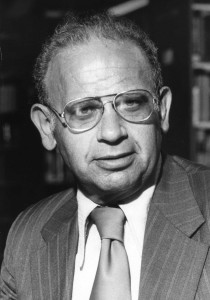In Memoriam: Howard B. Radest (1928-2014)

Dr. Howard Radest, a former member of the Humanist magazine’s editorial advisory board and longtime contributor, died on October 11 at the age of eighty-six.
Born in Brooklyn, New York, Radest lived the life of a humanist. He was a visionary who believed that if humanism was to thrive it needed to be sustained by solid institutions. He primarily associated and was identified with the Ethical Culture movement but embraced the wider humanist ecumenical project.
With a BA from Columbia University and a master’s from the New School, Radest became the first leader of the Ethical Culture Society of Bergen County, New Jersey, in 1956, a position he held until 1964. Under his leadership the society grew quickly, laying the foundation for the thriving humanist community it remains today.
After serving in New Jersey, Radest became the executive director of Ethical Culture’s federated organization, the American Ethical Union. He was an activist director who broadened the scope and influence of the AEU and reached out to form coalitions with other humanist groups, including the American Humanist Association. He assumed a shared role with Paul Kurtz, then editor of the Humanist, in the publication of the magazine. It was at this time that Ethical Culture joined with the AHA and the Unitarian Universalist Association to hire a professional lobbyist to push forward humanist interests on Capitol Hill. A related action undertaken by Radest, a life-long pacifist, along with his colleague, Edward Ericson, was to leverage conscientious objector status for humanists. This was achieved through a series of face-to-face meetings with General Lewis Hershey, then director of the Selective Service.
While serving as executive director of the AEU, Radest completed his doctorate in philosophy at Columbia and authored Toward Common Ground, which still stands as the definitive history of the Ethical movement in the United States. It was during his tenure at the AEU that Radest became president of the International Humanist and Ethical Union, which Ethical Culture helped found in the early 1950s. It was through his stewardship of the IHEU that many of us learned that humanism was indeed a global phenomenon, and Radest was pleased to introduce us to many of our soon-to-be colleagues at IHEU congresses held in Amsterdam, London, Oslo, and, more recently, in the developing world.
Radest moved on to become one of the original professors at Ramapo College, an arm of the state university system in New Jersey. He left the university to become the director of the Ethical Culture Schools, a position he held for twelve years, ending in 1991. In was during this phase that he established a moral education center at Columbia, a project that continues to explore ethical pedagogy to this day.
After leaving the directorship of the Ethical Culture Schools, Radest officially retired, and with his wife, Rita, relocated to Hilton Head, South Carolina. But he did not retire from his work on behalf of humanist causes. He was a cofounder, together with Sherwin Wine, of the Humanist Institute, which educates lay members from the Ethical movement, the AHA, the UUA, and the Society for Humanistic Judaism in the foundations of humanist thought and in related skills to become more effective spokespersons and activists for the humanist cause. As the first dean of the institute, Radest chartered its course and helped shape its scope and direction by recruiting mentors for each of its classes, refining its curriculum, and ensuring its financial solvency.
In his new home in South Carolina, Radest taught medical ethics and comparative religion at the local branch of the University of South Carolina while chairing the ethics committee of the South Carolina Medical Association. Out of his work in the humanist world and related fields, he found the inspiration to author nine books and innumerable articles for various journals of opinion. (His last article for the Humanist was a review of Kristen Stewart’s, The Good News Club: The Christian Right’s Stealth Assault on America’s Children in the March/April 2013 issue.)
Radest’s last major organizational commitment was as a founder and chair of the board of the Ethical Charter School located in Jersey City that carries forward the values that lie at the center of Ethical Culture and its philosophy of life.
This long list of accomplishments cannot by itself convey Radest’s dedication to the humanist cause. His devotion to humanism was not merely reflected in his serving on boards and committees, and for being an articulate, indeed brilliant, spokesperson for the values to which he was deeply committed. Nor was it even manifested in his founding of a raft of humanist organizations. Rather, having brought such organizations into being, he stuck with them. He made sure that he brought the most talented people with him. He oversaw serious and well managed organizational structures. And he knew the importance of providing a strong financial basis to ensure that each of the organizations he brought into being would have a viable future. And he did this not in short term, but persistently for years and throughout his long and productive life.
Without bombast and without high drama, Howard Radest stood as a giant of the contemporary humanist movement. He influenced for the better the lives of countless women and men who shared his convictions about humanism and what it takes to create a decent and humane world. The ideals that he loved and that inspired him, and the contributions that emerged from them, will live on as testaments to his thought, his dedication, and his deeds.
Howard Radest is survived by his wife, two sons, two daughters-in-law, and five grandchildren. A memorial service will be held on Saturday, November 15, 2014 at the New York Society for Ethical Culture.
